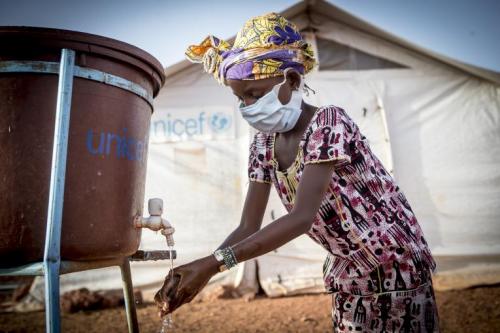FACT SHEET: Lack of handwashing with soap puts millions at increased risk to COVID-19 and other infectious diseases
Although handwashing with soap is critical in the fight against infectious diseases, including COVID-19, millions of people around the world have no ready access to a place to wash their hands, UNICEF said ahead of Global Handwashing Day.

“The pandemic has highlighted the critical role of hand hygiene in disease prevention. It has also stressed a preexisting problem for many: Handwashing with soap remains out of reach for millions of children where they’re born, live and learn,” said Kelly Ann Naylor, UNICEF Associate Director of Water, Sanitation and Hygiene. “It’s unacceptable that the most vulnerable communities are unable to use the simplest of methods to protect themselves and their loved ones. We must take immediate action to make handwashing with soap accessible to everyone, everywhere – now and in the future.”
According to the latest estimates:
•Only 3 out of 5 people worldwide have basic handwashing facilities.
•40 per cent of the world’s population, or 3 billion people, do not have a handwashing facility with water and soap at home.
•Nearly three quarters of the people in the least developed countries lack basic handwashing facilities at home.
•43 per cent of schools lacked a handwashing facility with water and soap affecting 818 million school-age children.
•In the least developed countries, 7 out of 10 schools have no place for children to wash their hands with water and soap.
•In the 60 countries identified as having the highest risk of health and humanitarian crises due to the virus:
* 2 out of 3 people – 1 billion people in total – lack basic handwashing facilities with soap and water at home. Around half are children.
* 3 in 4 children lacked basic handwashing service at their school at the start of
the outbreak; half of all children lacked basic water service; and more than half lacked basic sanitation service.
•In sub-Saharan Africa, 63 per cent of people in urban areas, or 258 million people, lack access to handwashing. Some 47 per cent of urban South Africans, for example, or 18 million people, lack basic handwashing facilities at home with the richest urban dwellers nearly 12 times more likely to have access to handwashing facility.
•In Central and South Asia, 22 per cent of people in urban areas, or 153 million people, lack access to handwashing. Nearly 50 per cent of urban Bangladeshis, for example, or 29 million people; and 20 per cent of urban Indians, or 91 million, lack basic handwashing facilities at home.
•In East Asia, 28 per cent of urban Indonesians, or 41 million people, and 15 per cent of urban Filipinos, or 7 million people, lack basic handwashing facilities at home.
UNICEF works around the world to ensure children and families have access to appropriate handwashing facilities. In addition to promoting handwashing in over 130 countries, UNICEF and WHO launched the Hand Hygiene for All initiative to support the development of national roadmaps to accelerate and sustain progress towards making hand hygiene a mainstay in public health interventions. This means rapidly improving access to handwashing facilities, water, soap and hand sanitizer in all settings, as well as promoting behavioural change interventions for optimal hand hygiene practices. Bringing together international, national, and local partners, the initiative aims to ensure affordable products and services are available and sustainable, especially in vulnerable and disadvantaged communities.
Source:United Nations Children's Fund
- 231 reads
Human Rights
Ringing FOWPAL’s Peace Bell for the World:Nobel Peace Prize Laureates’ Visions and Actions

Protecting the World’s Cultural Diversity for a Sustainable Future

The Peace Bell Resonates at the 27th Eurasian Economic Summit

Declaration of World Day of the Power of Hope Endorsed by People in 158 Nations

Puppet Show I International Friendship Day 2020

